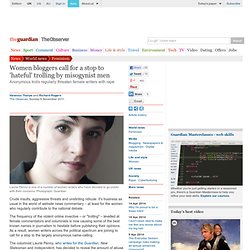

Lecturer at Bournemouth University
# Politics Activism. Politics. Online Political Activism. Women bloggers call for a stop to 'hateful' trolling by misogynist men. Laurie Penny is one of a number of women writers who have decided to go public with their concerns.

Photograph: Guardian Crude insults, aggressive threats and unstinting ridicule: it's business as usual in the world of website news commentary – at least for the women who regularly contribute to the national debate. The frequency of the violent online invective – or "trolling" – levelled at female commentators and columnists is now causing some of the best known names in journalism to hesitate before publishing their opinions. As a result, women writers across the political spectrum are joining to call for a stop to the largely anonymous name-calling. The columnist Laurie Penny, who writes for the Guardian, New Statesman and Independent, has decided to reveal the amount of abuse she receives in an effort to persuade online discussion forums to police threatening comments more effectively.
The author and feminist writer Natasha Walter has also been deterred. Leftist Sexism. Ruth Fowler has used two Counterpunch columns to criticize Angelina Jolie for writing a New York Times essay to discuss her decision to have a double mastectomy while not recognizing and acknowledging: 1) the economic means she holds to undergo an expensive medical procedure other women can’t afford; and 2) that a corporation called Myriad Genetics is generating enormous profits by driving up screening tests for breast cancer.

Fowler argues that these contradictions undermine Jolie’s credibility to speak for survivors of breast cancer. We disagree. First and foremost, all medical patients diagnosed with potentially fatal illnesses deserve to be treated with dignity and respect. Jolie deserves respect as someone who spoke out bravely about the difficult decision to have a double mastectomy rather than risk getting breast cancer. Fowler fails to acknowledge this and uses Jolie’s celebrity to try to strip her of her fundamental humanity. Bill Mullen helped in drafting this article. Signed, On rape threats and internet trolls. On Thursday, I posted a blog about the sexist abuse that female bloggers routinely face online.

I'd seen my fellow NS blogger Laurie Penny retweeting some of worst insults and threats that she gets, and remembered that I'd seen other women describe similar experiences. What I didn't realise was quite how many people weren't aware of the problem. Large news sites filter out the worst abuse, and as one of our contributors pointed out, she doesn't publish insulting comments on her blog because they make it feel "squalid, unsafe and invaded". The other thing I learned was that it isn't just the rape, death and other threats which affect those writing online.
There is also a low-level sledging, based around gender, which wears down many female bloggers. Some people didn't want to hear it, of course: regular complaints were that we should "grow a pair" and accept that all internet commenters get abused. There were better critiques, though. PS. Sexism in the workplace is alive and well: Adria Richards is its latest victim. The Adria Richards story isn't a new one: Woman publicly says something about sexism.

The internet hordes descend. Woman is on the receiving end of rape and death threats. Woman disappears for a while, sometimes forever. Commentators who believe themselves to be "reasonable" pontificate on everything woman could have done differently to avoid such a fate, and suggest that women who object to sexism or sexualized workplaces just need to have a sense of humor.
Or be less difficult. Adria Richards. The details of the latest incarnation of this story involve Adria Richards, a developer evangelist for the company SendGrid. Unfortunately, it didn't end there. Pew: Online Political Activism Grows, But ‘Slacktivism’ Problem Remains. The level of people’s political participation online in 2012 has increased since 2008 — with 72 percent of all Americans participating in at least one activity, such as posting links to political stories or following elected officials, according to the latest Pew Research Center report on civic engagement.

But one thing hasn’t changed: Those with lower incomes and education levels continue to be less politically engaged — both online and off — than those who are more affluent with college or graduate degrees. Zooming in on the limited participation of this younger, lower-income, less-educated demographic exposes challenges of achieving widespread political engagement in the digital age. So how do we get even more people to participate in civic activities? Think digital literacy and empowering people with better knowledge of the issues at hand. Improving Participation Ethan Zuckerman Levers of change The Gap in Internet Skills Hargittai raised the importance of access points. Eszter Hargittai.